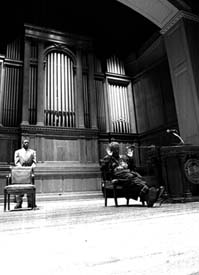
"The greatest success of the civil-rights movement was raising the level of consciousness about people," wrote activist Kwame Ture this spring in The New Yorker. When Ture, formerly known as Stokely Carmichael, spoke in Finney Chapel in March, he took that idea a step further: A revolutionary's "main objective is to raise the political consciousness of people until they become self-conscious."
In the aftermath of his visit, there was no doubt that his remarks heightened levels of consciousness among students, faculty, and staff alike. Discourse and disagreement resonated across the campus long after the former chair of the Student Non-Violent Coordinating Committee (SNCC) and founder of the Black Panther and All-African Peoples Revolutionary parties had exited the stage.
Third World House sponsored Ture's evening lecture, "Pan Africanism and Humanity," as part of a student-organized lecture series on people of color and revolutionary politics. That speech, about the need for unity in the black community and the inevitability of an anticapitalist movement to unite Africa and Africans, went without incident. That was not the case earlier in the day.
When they learned of his coming, Students for a Free Palestine invited Ture to give a talk on Zionism. The simplicity of the talk's title, "Zionism," stood in marked contrast to the complexity of emotion and intellect it generated.
When asked about his oft-repeated remark, "The only good Zionist is a dead Zionist," Ture distinguished between anti-Semitism, a sentiment he denies sharing--"I will never say anything against Judaism . . . I'm proud that Africa gave birth to Judaism"--and anti-Zionism, to which he readily aligns himself--"Zionism is about land. . . . Israel will always belong to the Palestinians just as America will always belong to the Indians."
When he reiterated his stance on Zionism, nearly 30 members of the near-capacity crowd stood in protest, turning their backs to Ture and maintaining their silent stance for the remainder of his speech. The gesture was reminiscent of reaction to Ture's appearance in Oberlin seven years ago.
Not all reactions were confined to quiet symbolism. Many who approached the microphones during the question and answer session challenged him and what they charged to be his anti-Semitism; some of those who praised his activist efforts distinguished those accomplishments from views they find repugnant or divisive; and some agreed with his reasoning and reading of history and politics. Others noted that Ture perpetuated negative stereotypes with remarks such as, "if you are a Jew, you're supposed to accept the suffering heaped upon you and know it's your responsibility and you chose it," thereby negating his self-characterization as an anti-Zionist, not an anti-Semite.
Formal and informal discussion of Ture's ideas continued after he left campus, including a teach-in sponsored by students and an open dialogue sponsored by the Office of Chaplains. Approximately 100 people attended the teach-in, during which Israeli emissary Zohar Raviv discussed Zionism and Judaism, ideas he described as hard to define because they are personal concepts. More than 70 people attended the open dialogue, which Rabbi Shimon Brand describes as "difficult, painful, yet rewarding." The discussions extended beyond Kwame Ture and issues of racism and anti-Semitism, says Brand, to questions about who controls political discourse on campus (and in America) and issues of identity and support.
--Marci Janas '91
For further coverage of Ture's talks and campus reaction, visit The Oberlin Review, Nommo, and The Voice
Return to Around Tappan Square
Return to the OAM Summer 1996 Table of Contents